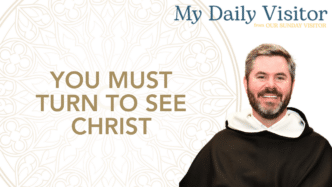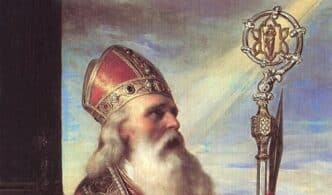This article first appeared in Our Sunday Visitor magazine. Subscribe to receive the monthly magazine here.
“What am I to do, Lord?” (Acts 22:10).
These words of St. Paul’s, spoken after he was knocked to the ground by the light and voice of Jesus Christ, are written into all of our hearts. St. Paul’s question for his Lord was urgent — and it concerned his purpose. Converts are quick to wonder about the purpose in their new life. Servant of God Dorothy Day prayed fervently at the Basilica of the National Shrine of the Immaculate Conception on the feast of the Immaculate Conception to know hers — only to find Peter Maurin sitting in her apartment when she returned home. Together they would co-found the Catholic Worker Movement and its houses of hospitality.
Hunting with God
If life isn’t always so obviously providential, we are, each one of us, as Emily Dickinson says in this poem, “loaded guns.” We all have some kind of God-given power, direction and brilliance — and there is a particular discomfort in not being sure what that life purpose is. We might be standing hopelessly in corners, like the narrator in the second line of the poem. At some point in our lives, most of us will have felt like a wallflower, a third wheel, unsure of what we’re called to do. Yet each one of us is irreplaceable — no matter how inadequate or lonely we think we are.
Each one of us has something to discharge into the world.
Crucially, the woman in this poem only languishes until the “Owner” shows up. Scholars have debated who that “Owner” may be — yet, who else could it be but God? He knows her, of course, just as he knows every single one of us and what we’re called to be. And then he walks with her through “Sovereign Woods”; they hunt together. When she speaks, it is for him. When she smiles, the light on the valley — God’s pleasure — glows back at her like a burning volcano. And at night, when they return home, she nurses his head and rests with him. She is engaged in his battle (the “foes,” I would suggest, are demons); her life is decided by this “Owner” who has shown her the way.
Carried by God
Was Emily Dickinson’s true purpose to spend years secluded in her bedroom, notwithstanding the glorious stash of poems she left us? One detail of this reclusive poet’s life that has always charmed me is that she chose to wear white. Why she did so, scholars are not sure. But there is a religious fervor in much of Dickinson’s poetry, and it’s possible that she decided to dress as a bride for the Bridegroom whom she wrote so much about — a Bridegroom who rescued her and “carried (her) away.” Our purpose, or the purpose of a solitary poet, might not always be obvious. But if we surrender to being “carried” by God, and “roaming” with him, our smiles will become his smiles; he will abide with us even in the darkness of the night. We’ll know that our true purpose — the only thing that will give us peace — is to shorten the distance between ourselves and him.
My Life had stood – a Loaded Gun
By: Emily Dickinson
My Life had stood – a Loaded Gun –
In Corners – till a Day
The Owner passed – identified –
And carried Me away –
And now We roam in Sovreign Woods –
And now We hunt the Doe –
And every time I speak for Him
The Mountains straight reply –
And do I smile, such cordial light
Opon the Valley glow –
It is as a Vesuvian face
Had let it’s pleasure through –
And when at Night – Our good Day done –
I guard My Master’s Head –
‘Tis better than the Eider Duck’s
Deep Pillow – to have shared –
To foe of His – I’m deadly foe –
None stir the second time –
On whom I lay a Yellow Eye –
Or an emphatic Thumb –
Though I than He – may longer live
He longer must – than I –
For I have but the power to kill,
Without – the power to die –








